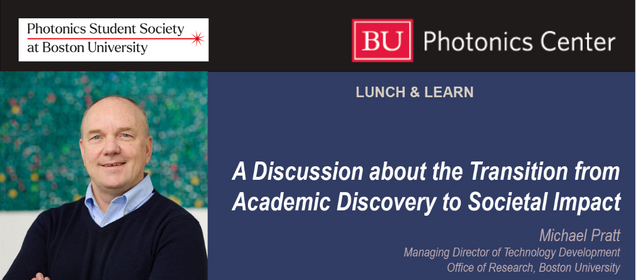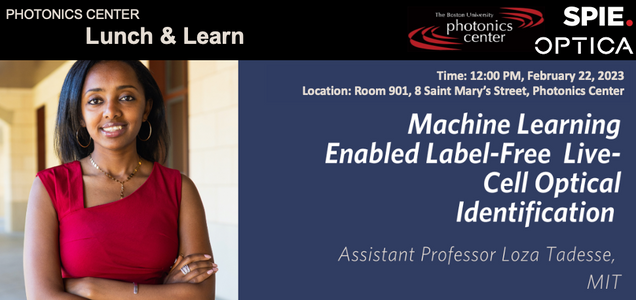Lunch and Learn
Lunch and Learn event (student-organized event with support from Boston University Photonics Center) has been carefully curated to provide a unique opportunity for professionals and enthusiasts in the optics and photonics field to expand their knowledge, engage in stimulating discussions, and connect with fellow visionaries in the field.
In the 2025 Spring semester, we will organize two Lunch and Learn events:
Time: 12:00 pm – 1:30 pm
Location: PHO 901
Thursday, March 27, 2025 – Michael Pratt (Managing Director of Technology Development at BU)
Wednesday, April 23, 2025 – Enrique (Kiko) Galvez (Physics Professor at Colgate University)

Thursday, March 27, 2025 – Michael Pratt (Managing Director of Technology Development)
Talk title: A Discussion about the Transition from Academic Discovery to Societal Impact
Abstract:
This talk will describe the process of converting academic discoveries into products and services that benefit society. Using plain language, Mr. Pratt will explain the process, help the audience understand the work that is required, and provide examples of how other BU scientists/engineers have accomplished this in the past.
Bio:
Michael Pratt joined Boston University Technology Development in May 2000 and is currently serving as the Managing Director. He worked in Technology Transfer, responsible for the transfer of technologies from the fields of physical, engineering, and computer sciences. As Director of the Office of Corporate Business Development, he is responsible for building long term partnerships with a special focus on technology development between Boston University/Boston Medical Center and industry. As Director of Translational Research & Corporate Relations, he also provides support to faculty that participate in translational research programs through proposal development, implementation of translational research, and facilitating collaboration with industry. As Executive Director Business Development, he led a team of business development professionals across all technical fields to connect Boston University discoveries with commercial opportunities.
In the 2024 Spring semester, we organized three Lunch and Learn events:
Time: 12:00 pm – 1:30 pm
Location: PHO 901
Tuesday, February 27, 2024 – Wanzheng Hu (BU)
Thursday, March 28, 2024 – Minjung Son (BU)
Tuesday, April 30, 2024 – Rachel Won (Nature Photonics)
In the 2023 Fall semester, we organized three Lunch and Learn events on the last Tuesday of each month:
Time: 12:00 pm – 1:30 pm
Location: PHO 901
Tuesday, September 26, 2023 – Tianyu Wang (new faculty BU ECE)
Tuesday, October 31, 2023 – Rita Strack (editor of Nature Methods)
Tuesday, November 28, 2023 – Neil Sinclair (Harvard, Lab for Nanoscale Optics)
Tuesday, Sep 26, 2023 – Tianyu Wang (BU new faculty)

Talk title: Analog photonic neural networks for large-scale AI models at the quantum limit
Abstract:

I will overview our work on analog neural networks based on photonics and other controllable physical systems. I will show how backpropagation can efficiently train physical neural networks (PNNs), and how to design physical network architectures for physics-based machine learning. I will review our work showing how nonlinear photonic neural networks may enhance computational sensing and how photonic neural networks may be operated robustly deep into low-energy regimes where quantum noise would ordinarily be a limiting factor. Finally, I will show that PNNs offer fundamental advantages for scaling AI models such as Transformers.
Bio:
Tianyu Wang is an incoming Assistant Professor to the Department of Electrical and Computer Engineering at Boston University. He is interested in developing novel methods for imaging, sensing, and computing by leveraging emerging technologies from photonics and artificial intelligence.
Tuesday, Oct 31, 2023 – Rita Strack (Nature Methods Editor)

Talk title: Publishing in Nature Methods
Abstract:
Join Rita Strack, PhD, for a discussion on Nature Methods, the role of professional editors, and the journal’s editorial criteria. Strack will offer tips for publishing high quality papers with an emphasis on microscopy and image analysis, and discuss the future of bioimaging and current trends in promoting reproducibility and reporting in microscopy.
Bio:
Rita Strack joined Nature Methods in November 2014, where she handles imaging, microscopy and probes, along with protein and RNA biochemistry content. While studying at the University of Chicago, she helped engineer improved variants of the red fluorescent protein DsRed, and studied the chemical mechanism of chromophore formation in DsRed. She continued her research as a postdoctoral fellow at Weill Cornell Medical College, where she developed fluorescent reporters for live-cell imaging of RNA such as Spinach2.
Tuesday, Nov 28, 2023 – Neil Sinclair (Harvard)

Talk title: Photonics and quantum information science with lithium niobate
Abstract:
The properties of lithium niobate: low optical loss, large second-order optical and electro-optic nonlinearities, and, recently, its use in integrated nanoscale devices, have driven advances in both applications and our understanding of light. We discuss photonic experiments performed jointly between Caltech, Fermilab, and the Jet Propulsion Lab using off-the-shelf lithium niobate waveguides as well as those performed at Harvard leveraging the novel functionalities of the thin-film lithium niobate platform.
Bio:
Neil studied quantum entanglement with Shohini Ghose during his B.Sc. studies at the University of Waterloo before joining Wolfgang Tittel’s group at the University of Calgary for his graduate work. In Calgary, he developed rare-earth-ion-doped crystals for quantum communication and signal processing applications. As a postdoctoral scholar, he worked on projects in quantum optics with Maria Spiropulu at Caltech and nanophotonics with Marko Lončar at Harvard. Neil continues to advance these areas of work as a Research Scientist.
In the 2023 Spring semester, we organized four Lunch and Learn events in the last week of each month:
Time: 12:00 pm – 1:30 pm
Location: PHO 901
Wednesday, February 22, 2023 – Loza Tadesse (MIT)
Wednesday, March 29, 2023 – Xiaojun Cheng (BU)
Tuesday, April 25, 2023 – Noah Rubin (Harvard)
Wednesday, May 31, 2023 – Alex Sushkov (BU)
Wednesday, February 22, 2023 – Loza Tadesse (MIT)
Talk title: Machine learning enabled label-free live-cell optical identification
Abstract:
Label-free live-cell monitoring is ideal for research and clinical applications; however, it presents unique challenges. In this talk, I will discuss how Raman spectroscopy can enable such a platform using bacteria identification as a case study. Current infection diagnostic methods are slow and costly, due to the long bacterial culturing steps. We demonstrate that Raman spectroscopy enables rapid culture-free, sensitive, and specific bacterial identification and antibiotic susceptibility testing. To this end, I will present three major milestones that bring Raman closer to clinical application by using machine learning and nanophotonics. First, we achieve high (>99%) species level classification accuracies across 30 major disease-causing bacterial species. Second, we showcase the first of its kind demonstration of a versatile and antibiotic co-incubation free susceptibility testing. Third, we develop a simple liquid well setup for clinical sample handling with uniform Raman spectral enhancement using gold nanorods. I will conclude with remarks on enabling widespread clinical translation of Raman spectroscopy and its vast potential for label-free live-cell studies with implications for both diagnostics and therapeutics.
Bio:
Loza Tadesse is the Brit (1961) & Alex (1949) d’Arbeloff Career Development Assistant Professor in Mechanical Engineering at MIT and an associate member of the Ragon Institute of MGH, MIT and Harvard. She received her PhD in Bioengineering from Stanford University in 2021 and previously was a medical student at St. Paul Hospital Millennium Medical College in Ethiopia. She also did a postdoctoral training at the University of California, Berkeley. Tadesse’s research program at MIT develops next generation point-of- care diagnostic devices using spectroscopy, optical, and machine learning tools for application for extreme environments such as developing nations, military sites, and space exploration. Tadesse has been listed as a 2022 Forbes 30 Under 30 in healthcare, received many awards including the Biomedical Engineering Society (BMES) Career Development Award, the Stanford DARE Fellowship and the Gates Foundation $200K grant for SciFro Inc., an educational non-profit in Ethiopia, which she co-founded.
Wednesday, March 29, 2023 – Xiaojun Cheng (BU)
Talk title: Measurements of human cerebral blood flow changes with speckle contrast optical spectroscopy
Abstract:
Cerebral blood flow (CBF) is a key indicator of brain function and health. Two optical techniques, diffuse correlation spectroscopy (DCS) and laser speckle contrast imaging (LSCI), can non-invasively measure CBF by analyzing speckle fluctuations of coherent light. However, DCS requires expensive equipment, while LSCI is mostly limited to superficial measurements in small animals. A new technique, speckle contrast optical spectroscopy (SCOS), uses low-cost cameras and larger source-detector separations to measure blood flow in deeper tissues. We have developed a fiber-based SCOS system with improved photon flux and a data analysis pipeline that corrects for noise-induced bias. SCOS outperformed DCS in terms of contrast to noise ratio and was validated through phantom and human forehead measurements. Human brain function measurements during a cognitive task were successfully carried out with SCOS, demonstrating its potential as a non-invasive, low-cost, and high-performance device for everyday monitoring of human brain functions.
Bio:
Dr. Xiaojun Cheng is a Research Assistant Professor in the department of Biomedical Engineering at Boston University. Dr. Cheng has a Ph.D. background in Physics conducting fundamental studies of wave scattering inside ordered and disordered media at the City University of New York. She has then worked as a postdoc at Boston University with Dr. David Boas on modeling and system designs for various optical imaging techniques. She has worked on optical microscopy for mouse brain imaging using multi-photon microscopy, optical coherence tomography (OCT) and laser speckle contrast imaging (LSCI). She has also worked on measuring human brain hemodynamics using techniques including functional near infrared spectroscopy (fNIRS), diffuse correlation spectroscopy (DCS), and has developed the novel fiber-based speckle contrast optical spectroscopy (SCOS) system and the data processing pipeline for human cerebral blood flow measurements. Dr. Cheng’s main focus is to exploit the speckle pattern arising from the interference of coherent scattered light to probe brain structure and function in health and disease.
Tuesday, April 25, 2023 – Noah Rubin (Harvard)
Talk title: Metasurface polarization optics
Abstract:
Metasurfaces are an emergent class of subwavelength diffractive optics. The individual elements comprising a metasurface may be designed with polarization sensitivity – in this way, metasurfaces can enable optical elements whose far-fields exhibit custom polarization- dependence. Using relatively simple design heuristics based on the Jones calculus, a variety of polarization-dependent optical elements can be realized. These include gratings (of particular interest for polarimetry), lenses, and holograms (the most general case). In this talk, we discuss these metasurface polarization optics, their historical antecedents, their design, and new polarization-sensitive optical elements based on metasurfaces. Metasurfaces ideally provide new additions to the traditional toolkit of polarization optics and may soon reach a level of maturity that sees their inclusion in practical optical systems for polarimetric remote sensing and other applications.
Bio:
Noah Rubin is a Research Associate at Harvard University in Cambridge, MA studying polarization optics and nanophotonics. He completed his Ph.D. in Applied Physics under Prof. Federico Capasso in 2020 as an NSF Graduate Research Fellow. Previously, he earned his bachelor’s degree in physics from the University of Pennsylvania in 2015.
Wednesday, May 31, 2023 – Alex Sushkov (BU)
Talk title: Quantum-limited magnetic resonance for fundamental and applied science
Abstract:
Associate Professor Alex Sushkov will describe his team’s laboratory-scale experimental search for ultralight axion dark matter. Their approach is based on precision nuclear magnetic resonance, pushed to the fundamental quantum sensitivity limits. Importantly, searches for new fundamental physics are not the only application of the quantum sensing tools they are developing.
Bio:
Dr. Sushkov received his PhD from UC Berkeley with a concentration in sensitive atomic magnetometry and magnetic resonance, and his postdoctoral work included measurements of the quantum Casimir effect and nanoscale magnetic resonance measurements with nitrogen-vacancy centers in diamond. He now leads an experimental group that searches for ultra-light axion-like dark matter and other beyond-standard-model physics, and explores how nanoscale sensing can shed new light on dynamics of many-body quantum systems.



